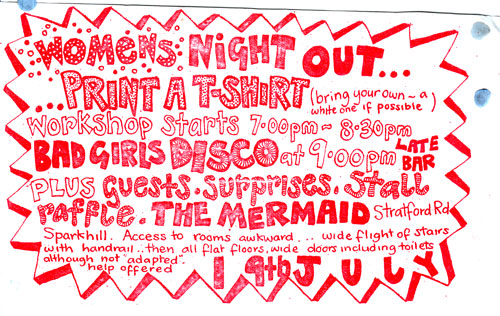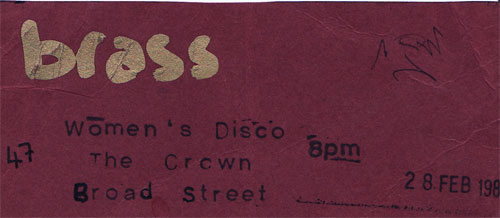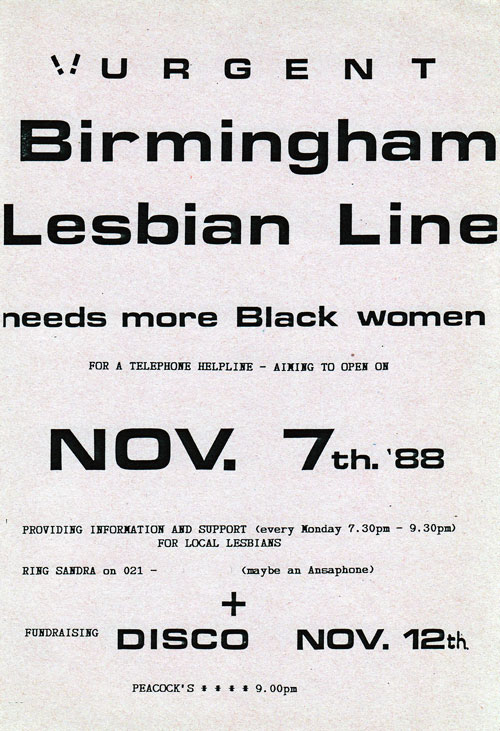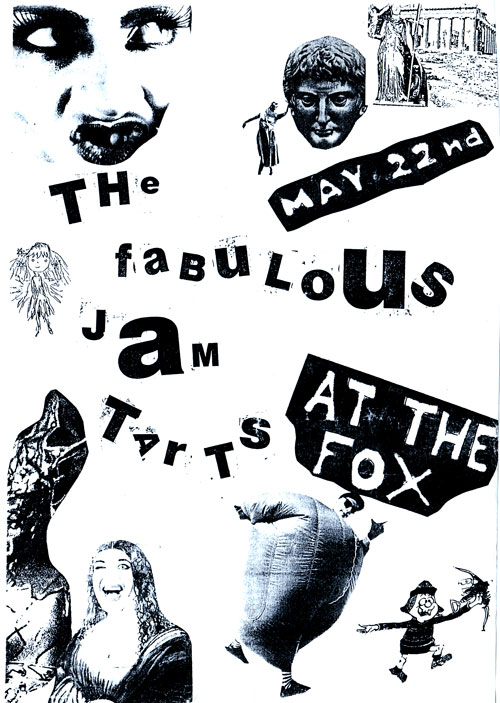Women's access to bars
Pre 1960s
Prior to the 1960s, and well into the 1970s there appears to have been very little opportunity indeed for lesbians to get together openly in a social or public space. All the bars noted as being popular with the gay crowd in the 40s and 50s seem to have been restricted to men, whether by design or default.
We only found one reference to gatherings of lesbians in the 1950s. Meriel Bloor mentions a rough Irish pub at the top of Digbeth, near to where Selfridges is now. She said women were not supposed to go in to bars alone or in twos in those days, but she went to this pub and women were in there quite happily in quite large numbers. Meriel says lesbians used to meet here and tried to pick her up several times.
1960s
During the 1960s, when venues targeting an exclusively gay (male) clientele started to open, usually restricting entry by membership and certainly regulated by a door person, there was generally a restriction to men. In some cases women could come in by invitation, if signed in by a male member. Membership was not granted to women.
During the 1960s some bars did become known as friendly to women, and one small Black Country pub, run by a lesbian, Sybil, soon attracted a significant lesbian crowd.
Noelle Gordon, not normally noted as a feminist or lesbian icon (!) was unwittingly influential in women gaining acceptance and later a welcome into male terrain in Birmingham. Because of her status as star of Crossroads, a popular 1960s TV soap set in an eponymous Birmingham motel, she would be welcomed into the male gay world, leaving the door ajar for non-celebrity lesbians to follow.
A number of contributors refer to her.
Meanwhile, in the 60s, some lesbians were lobbying for membership of clubs such as the Nightingale Camp Hill to be extended to women. Later, women actually picketed men’s bars to gain access.
In the early 1970s Guys Limited was picketed by a group of 20 – 30 lesbians, resulting in a discussion with the management on the street, and a concession to allow women entry to a mixed night on a Tuesday. This instantly became the busiest and most successful night of the week, and the mixed Tuesday night was carried over into a successor business, the Grosvenor House Hotel, on Hagley Road.
See quotes from Keith Campbell, then owner of Guys Limited, and the Grosvenor.
With the growth of the women’s movement during the 1970s and an interest in acquiring women only space, a selection of women’s nights were negotiated at some venues.While initially not welcoming to women, particularly ‘lefty’ women, Laurie Williams later allowed women into his new bar, the Jug, luckily able to smoothly change the meaning of the Jug from ‘Just Us Guys’ to ‘Just Us Gays’.
Gradually women started organising women only spaces including at The Imperial Hotel, in the Purple Room at the Greyhound Cider House, and at the Communist Party's HQ the Star Club.
Meanwhile lesbians, particularly the more political section, had colonised the tiny pool room at the rear of the Old Moseley Arms, affectionately known as the 'Old Mo’ which was regularly packed from wall to wall. The Old Mo in the 70s and 80s was frequented by many of our contributors.
Women also organised various ad hoc gatherings, often as post conference socials, famously after the Women's Liberation Conference of 1978 and also as fund-raisers for groups. These often featured local women musicians and singers.
For example, following the Birmingham Women’s Fair on 12 December 1981 at Dr Johnson’s House, there was a fund-raising benefit for Birmingham Women's Paper, at the Star Club, Essex Street, featuring ‘Strumpet’ a women’s band and Bad Girls Disco. Proclaimed as ‘all women welcome’ such gatherings were often dominated by lesbians.
Lesbians also congregated at women's music events and concerts.
As well as the 'Old Mo’ lesbians congregated in a number of out of town bars, particularly in the Moseley and King's Heath areas.
‘Sheila's Bar’ was held on a Tuesday night, in the back room of the Station Pub in King's Heath, from approximately 1988 to the early 90s.
The back room of the Malt Shovel was also very popular and gained a reputation locally for its lesbian clientele.
In addition, during much of the 80s and 90s there was a number of regular and ad hoc benefit events in a variety of places hired for the purpose, including school halls and upstairs rooms in pubs. Many women, particularly the lesbian feminists, socialised at such various women’s discos and ad hoc fundraisers rather than the commercial scene. Such women's venues always had to have someone on the door to stop men coming in.
Lesbian Line fundraiser discos were held at The Matador (where new Bull Ring market is now) on the 2nd and 4th Friday and the third Saturday each month, during the period from around 1985 to 91/92. A number of other short lived discos came and went including ones run by ‘Henrietta's Out’ and a ‘Slice of Lemon’.
From around 1996 monthly women's discos were held at the Union Club, Pershore Road, organised by Wash, a trade unionist.
Meanwhile, on the commercial scene, by the mid-90s, the male preserve of the bars was gone and women were free to go to whatever gay bars and clubs were on offer at the time.
Also in the 90s there were a number of nights on the commercial scene catering for a wider mixed crowd, such as SLAG at the Steering Wheel, and actively encouraging integration of straights, lesbians and gay men.
Perhaps because of this the impetus for women’s bars was less important and throughout the 90s no one bar predominated.
However this changed in the 2000s with the appointment of Hilli Rishworth as manager at the Fox, where she has actively promoted the venue as a women’s bar and it is regularly voted best women’s bar in the Midlands in Midlands Zone Readers' Awards.
Have a memory of this? Signup today and tell us about it! or login!